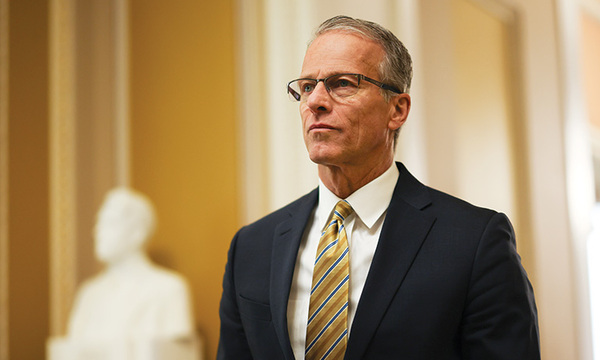La Mirada felt a little bit like Wittenberg or Geneva on April 29. The eyes of the evangelical theological world focused on Biola’s Calvary Chapel, where a standing-room-only crowd (in addition to thousands of online viewers) watched theologians discuss and debate the past, present and future shape of Protestantism, particularly in relation to Roman Catholicism.
The event’s genesis dated back to November 2013, when theologian Peter Leithart called for in a widely read essay in First Things, suggesting that while the Reformation isn’t over, “Protestantism is, or should be.”
The essay prompted Biola professor Fred Sanders to pen a rebuttal, titled published on the Scriptorium Daily blog. After a rebuttal-to-the-rebuttal from Leithart and further online conversation, Biola’s Torrey Honors Institute decided to partner with First Things and the Davenant Trust to sponsor a live conversation about the topic.
The resulting event, “The Future of Protestantism,” took place at Biola on April 29. Moderated by the Davenant Trust’s Peter Escalante, the event gathered Leithart (an ecumenically minded advocate of “Reformational catholicism”), Sanders (a self-described representative of the “unwashed masses of low-church evangelicals”) and Carl Trueman of Westminster Seminary (speaking for creedal and confessional Protestantism). The three men spent two hours dialoguing about what form Protestantism should take in the 21st century. Are the “protests” of the Reformation still necessary or should unity as the one body of Christ be the goal as religion in general becomes marginalized in the secularizing West? How does this all shake out doctrinally and pastorally?
Though the panelists differed on issues such as the Eucharist and the contours of doctrinal agreement required for ecclesiological unity, they also agreed on much, such as the importance of practical pastoral ministry and the fact that a weak connection to Protestant history is a problem for the contemporary church. In a follow-up blog post, titled Sanders compared the discussion to “three medical doctors looking at the same ailment and disagreeing about its severity, the diagnosis and the right course of treatment.”
In addition to a capacity crowd in person, the conversation was live-streamed online to more than 2,700 others, watching from 47 states and 30 foreign countries. A lively Twitter conversation also took place using the #protfuture hashtag, generating more than 2,300 tweets over the course of the evening. The event also launched a significant follow-up conversation in the blogosphere. Leithart, Sanders and Trueman each published their own commentaries on the event, as did prominent bloggers such as Douglas Wilson, Patrick Schreiner, Derek Rishmawy, Brad Littlejohn and Matthew Lee Anderson (’04), who helped organize the event. As the conversation spread, a YouTube video of the event quickly accumulated views. (It had more than 13,000 at press time.)
‚ÄúI‚Äôm proud to see ∫⁄¡œ¿˙ ∑ hosting this kind of discussion,‚Äù said Sanders, calling the event a model of ‚Äúprincipled Protestantism that serves churches, an evangelical witness that advocates commitment to the gospel, and fair academic conversation that seeks to understand a variety of views without distorting them.‚Äù
As an outcome of the event, Sanders said he plans to edit a book, to be published by Zondervan Academic, that will extend the “Future of Protestantism” conversation and include new voices in addition to the original participants.
Hash(tagg)ing it out
A collection of live tweets from the April 29 #protfuture discussion
Leithart: "But if God is alive and is Creator, why would we think the church reached its final form in 1517?"
— Torrey Honors (@TorreyHonors)
"I hope to see churches that neglect the Eucharist to be blasted from the earth." !!!
— Bart Gingerich (@bjgingerich)
. shining with classic Sanderishness: being theological sound, informative, and hilarious at the same time.
— Derek Rishmawy (@DZRishmawy)
Anyone else think that Peter Escalante desperately needs a monocle? I'm pretty sure that there are monocles and mustaches in the
— Joe Rigney (@joe_rigney)
Other than Carl Trueman, does anyone else on the panel actually subscribe to a Confession?
— Anthony Bradley (@drantbradley)
"Liberalism is a different religion. Catholicism is not a different religion."
— Brett McCracken (@brettmccracken)
I just threw out a Pentecostal 'Amen!' on behalf off Presbyterianism. I am the .
— Derek Rishmawy (@DZRishmawy)
Not watching the convo, but by the tweets, looks like more of looking back than future. No? Probably a good thing.
— John Starke (@john_starke)
Escalante: The one thing you all have in common is a very pastoral vision for the one catholic church.
— Matthew Anderson (@mattleeanderson)
Protestare (to protest) = more than to object to Roman abuses. It = "to testify, to give witness to the truth"
— R. Scott Clark (@RScottClark)
Really enjoyed but literally every five minutes I thought a Lutheran at the table would go a long way to resolving
— Mollie (@MZHemingway)
.: 1st priority of unity must be within Protestantism. Start with disunity within Presbyterianism, for e.g.
‚Äî ∫⁄¡œ¿˙ ∑ (@biolau)
Maybe unity could = & merging for . Wright, Volf, Leithart, Sanders & Trueman on 1 stage!
— Brett McCracken (@brettmccracken)
Emerging consensus: Things are getting bad for the church in America, which may just make us accidental ecumenists.
— Torrey Honors (@TorreyHonors)
Thanks for tonight's excellent event!
‚Äî ∫⁄¡œ¿˙ ∑ (@biolau)
 ∫⁄¡œ¿˙ ∑
∫⁄¡œ¿˙ ∑



